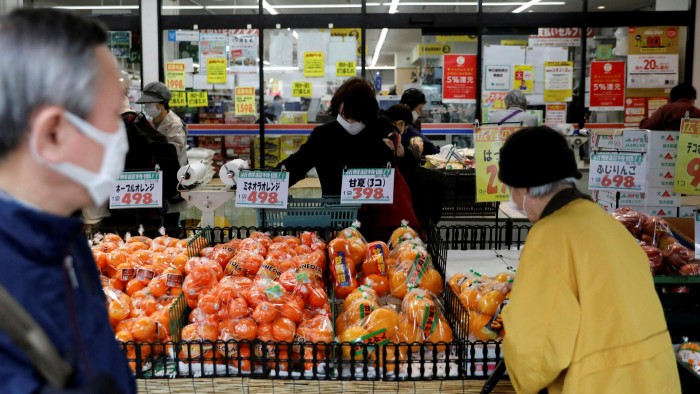Japan must hit inflation target via domestic demand, Kishida aide insists

Roula Khalaf, Editor of the FT, selects her favourite stories in this weekly newsletter.
Japan must hit its 2 per cent inflation target and do so via higher domestic demand, not surging commodity prices, according to one of Prime Minister Fumio Kishida’s most powerful aides.
Speaking to the Financial Times, deputy chief cabinet secretary Seiji Kihara said Kishida’s promise of a “New Capitalism” did not mark a departure from “Abenomics” but instead built on the economic strategy of Shinzo Abe, the former prime minister.
The commitment to 2 per cent inflation will have implications for the appointment of a successor to Haruhiko Kuroda, the Bank of Japan governor, when his term expires next year. It may also add to downward pressure on the yen if Japan keeps interest rates low while they rise in the US.
“The most important thing is to end deflation,” Kihara said. “There may be some misunderstanding, but the fundamental policy of the Kishida administration is still Abenomics.”
Abe’s economic policy from 2012 to 2020 included the appointment of Kuroda, who launched a massive monetary stimulus programme. Japanese interest rates are still at minus 0.1 per cent with no lift-off in sight, despite rate rises in other countries.
Kihara made clear that imported pressures from rising commodity prices owing to the war in Ukraine would not be enough to meet the inflation target sustainably. “It has to be demand-pull inflation,” he said. “We haven’t achieved that yet.”
Economists expect Japanese headline inflation to hit 2 per cent as early as April because the yen is falling, the oil price is surging and last year’s cuts to mobile phone bills will drop out of the comparison. Excluding volatile commodity prices, however, underlying inflation is still weak.
A former finance ministry bureaucrat turned politician, Kihara is widely regarded as an éminence grise of the Kishida administration, credited with engineering his boss’s successful bid for the premiership last autumn.
Shortly after his victory, Kishida appeared to suggest a departure from Abenomics. He pledged to end “shareholder capitalism”, criticised his party for failing to deliver broad-based growth and said it had veered towards neoliberalism. That sparked a backlash from Abe, said political observers, while ideas such as limiting share buybacks spooked markets.
Kihara forcefully rejected the idea that “New Capitalism” marked a break from the macroeconomic framework of Abenomics. Rather, he said, it disputed the idea that deregulation was sufficient to generate economic growth.
Arguing that the US, Europe and China were all deploying fiscal stimulus, Kihara said: “It’s an illusion to think that Japan can raise business investment and [research and development] . . . with just regulatory reform and administrative reform.” Strategic government spending in areas such as artificial intelligence and biotechnology was needed to prime the pump and increase the rate of start-ups, he said.
The Russian invasion of Ukraine delivered another economic shock and Japan has joined in G7 sanctions. But Kihara said there was no chance of abandoning energy projects jointly developed with Russia in Sakhalin, citing Japan’s reliance on oil and gas imports and the need to “stay strong to be able to impose fresh sanctions”.
Kihara’s remarks were the clearest declaration yet on the energy projects from a top-level Japanese official. Among others, at stake is the Sakhalin-2 project, from which Japan sources nearly 10 per cent of its liquefied natural gas, and where trading houses Mitsui and Mitsubishi have kept their stakes even as Shell pulled out in the wake of Russia’s invasion.
“There’s no way we’re giving up Sakhalin on our own or pulling out on our own,” Kihara said. “Unfortunately, our country’s energy self-sufficiency rate is in the single digits and we are the most vulnerable country in the G7, so for us, energy is a matter of life and death.”
Comments